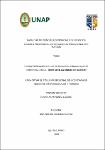Caracterización de las artesanías urbanas que se comercializan al turista en la ciudad de Iquitos
Abstract
La tesis “Caracterización de las artesanías urbanas que se comercializan al turista en la ciudad de Iquitos”, tiene como objetivo estudiar la condición situacional de los artesanos de dos centros o complejos artesanales más significativos de la ciudad de Iquitos, uno en el distrito de San Juan y otro en el distrito de Iquitos. El instrumento de recolección de datos fue la Encuesta con un cuestionario de 28 preguntas, la muestra fue aplicada a 25 artesanos. La investigación es desde un modelo de investigación descriptiva bajo un modelo cuantitativo, no experimental, transversal. Se recogieron los datos en una oportunidad cumpliendo con los principios éticos en todos los momentos de la aplicación del instrumento, en el desarrollo de la investigación o informe final. La confiabilidad del instrumento fue: α = 0,803, indicador que la encuesta es muy confiable. Se ha procesado los datos en el programa estadístico SPSS 24. La encuesta ha sido aplicada a 14 hombres y 11 mujeres, indicador que dice que la acción de la mujer ya es significativa en los negocios artesanales. La hipótesis descriptiva fue demostrada arribando a la siguiente conclusión que se rechaza la hipótesis porque la comercialización de las artesanías urbanas no es muy significativa en la ciudad de Iquitos. Efectivamente, los artesanos adolecen de debilidades como en Capacitación, Innovación tecnológica, Logística, Organización, Mercado nacional y extranjero y en cambios de las artesanas para mejorar la presentación, así como en atención al cliente. The thesis “Characterization of urban crafts that are sold to tourists in the city of Iquitos”, aims to study the situational condition of artisans of two centers or more significant craft complexes of the city of Iquitos, one in the district of San Juan and another in the district of Iquitos. The data collection instrument was the Survey with a questionnaire of 28 questions, the sample was applied to 25 artisans. The research is from a descriptive research model under a quantitative, non-experimental, transversal model. The data were collected in an opportunity complying with ethical principles at all times of the application of the instrument, in the development of the investigation or final report. The reliability of the instrument was: α = 0.803, an indicator that the survey is very reliable. The data has been processed in the SPSS 24 statistical program. The survey has been applied to 14 men and 11 women, an indicator that says that the action of women is already significant in artisanal businesses. The descriptive hypothesis was demonstrated by arriving at the following conclusion that the hypothesis is rejected because the commercialization of urban crafts is not very significant in the city of Iquitos. Indeed, artisans suffer from weaknesses such as Training, Technological Innovation, Logistics, Organization, National and foreign markets and changes in artisans to improve presentation, as well as customer service.
Collections
- Tesis [176]


